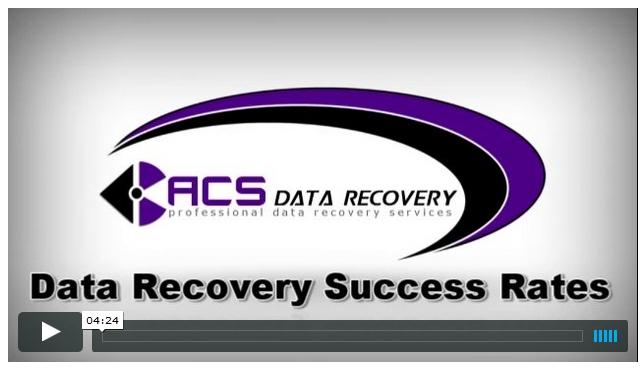When looking for the best data recovery provider there are literally thousands of options. Doing a quick Google search of the term “data recovery services” yields around 500,000 results. With so many options, the toughest part of the process may involve the decision on where to send your drive. When you’ve lost your data, you only care about getting it back, right? In order to get your data back, you want the absolute best company working for you at a price that fits within your budget. So how do you go about finding “the best” data recovery provider? Most consumers looking for data recovery will consider the company’s success rate. This has become a rather good marketing ploy that can take advantage of an unsuspecting customer if they are not careful.
Data Recovery Success Rates
Many companies like to tout huge success rates of 90% or greater, some even goes as far as saying they can recover 98% of the jobs they receive. But can they really? How are they arriving at these numbers? Who audits them to verify their findings? Many times these are just numbers pulled out of thin air, and even if they are legitimate, there are so many exceptions to how they generated these numbers that it is at the very least, misleading the consumer.
The fact is, no data recovery company can boast of such high success rates unless: A) they receive very few data recovery cases, B) they do not count drives that are severely damaged with scored platters, fire or flood damage, or C) they are extremely lucky and get very few severely damaged drives. In reality, it is probably more accurate to say that the average data recovery firms are only able to recover a little more than half the drives they receive. Probably in the neighborhood of 60%-75% on average. Not 90+%. There are many cases where a drive just cannot be recovered. Your data is basically held to the platter by a thin magnetic coating. If that coating is wiped from the drive when the platters are scored, it becomes “intellectual dust” floating around the inside of your hard drive case, and quite frankly, only God would have the ability to reassemble your information. It would be akin to having a nice snowman in your front yard, and suddenly a snow blower comes along and destroys it. Sure, the snow is still there, but you’ll never put it back together exactly the way it was before. Unfortunately, hard drives are VERY exact, and for your data to be recoverable, everything has to be as perfect as possible.
Watch A Video Discussing Success Rates In The Data Recovery Industry
The Flaw In Factoring Success Rates
So how does a company get a 90%+ success rate? Are they lying? Not necessarily. It depends on what they base their figures on. If ACS Data Recovery were to measure our success rate by the recoverable jobs we receive, which consists of drives that contain no platter scoring, no fire damage, no severe water corrosion, no RAID jobs that have had multiple rebuilds and drive swaps, then our success would be right around 99%. Most, of the drives we receive that are recoverable, can be recovered by us. However, if you factor in all the jobs we receive, including the ones that no data recovery company can recover from ( for example, cases with severe platter damage), then our success rate may be around 70-75% on average. Neither of those numbers look good on paper.
So how should a data recovery company list their success rate in order to attract customers? 99% success rate seems too bogus, but it looks good to the average web searcher looking for data recovery services. On the other hand, 75% to the average consumer gives the impression that you are just doing this for a hobby. So what should the consumer base their decision on? We have found that the best solution is to be upfront and honest with the customers from the very beginning, and let them know that there are times when data is unrecoverable, due to scored platters, severe data corruption, etc. That is just life, and there’s nothing that we can do about it here at ACS Data Recovery, or any other data recovery firm for that matter. There is no magic piece of equipment that can rebuild scored platters, or read from severely corroded or warped drives. The intricacies related to a hard drives functionality rule out any possibility of miracle equipment that will some how restore data from a platter that has been wiped clean due to a head crash. Instead of lying to you with success rates that more than likely can not be substantiated with any supportive data, we back up our work by letting you know up front we don’t get paid unless we recover your data. In other words our business, and it’s sole survival, revolves around actually recovering data for as many customers as possible. With this kind of business model, we have to be good at what we do, and our continued growth is a testament to our success rate. You can be assured that we will exhaust every option we have available in order to recover your data.



